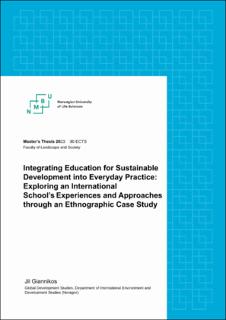| dc.contributor.advisor | Siri Eriksen; Rosalie Gwen Mathie | |
| dc.contributor.author | Giannikos, Jil Leonie Catharina | |
| dc.date.accessioned | 2023-10-25T16:27:10Z | |
| dc.date.available | 2023-10-25T16:27:10Z | |
| dc.date.issued | 2023 | |
| dc.identifier | no.nmbu:wiseflow:6873791:55153123 | |
| dc.identifier.uri | https://hdl.handle.net/11250/3098760 | |
| dc.description.abstract | This master’s thesis investigates the support provided to teachers in fostering Education for Sustainable Development (ESD) within schools. The study was carried out at a private international school in France following a unique school concept. An ethnographic design facilitated a comprehensive study of three months involving participant observations, non-participant observations, and interviews. The research adopts an instrumental case study approach, which focuses on illuminating the particular issue of educators transitioning from traditional teaching methods to an alternative concept. Key findings highlight four factors that support teachers, such as the implementation of a buddy system for collaboration and meaningful learning experiences among teachers. It also identifies six limitations, including the lack of clear guidance and sufficient professional development opportunities. The research further evaluates how the school aligns with UNESCO’s (2021) ESD guidelines highlighting both areas of success and improvement. Here, the findings show a connection between the physical environment and the teaching experience and how it can negatively impact the teacher if the space does not align with the pedagogy. The study also found that it is unrealistic for one teacher to embody all the competencies that are relevant to an effective implementation of ESD. Instead, a diverse team can expose students to all competencies by collaborating and considering their own multiple intelligences and the ones of their students.
This qualitative study offers unique contributions by amplifying teachers’ voices, illuminating their challenges, and highlighting the importance of supportive learning environments for ESD. Further research is essential for broader generalizability, optimizing the learning environment, and collaborative teacher education to enhance ESD implementation and sustainability. | |
| dc.description.abstract | | |
| dc.language | eng | |
| dc.publisher | Norwegian University of Life Sciences | |
| dc.title | Integrating Education for Sustainable Development into Everyday Practice: Exploring an International School’s Experiences and Approaches through an Ethnographic Case Study | |
| dc.type | Master thesis | |
